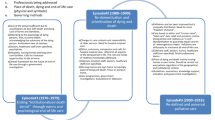Abstract
According to the Canadian law legalizing physicians to provide medical assistance in dying (MAID) under certain circumstances, the patients alone determine if their suffering cannot be relieved under conditions “that they consider acceptable.” This contrasts with the laws on MAID in the Netherlands, which require that physicians only grant access to MAID if they concur with the patient that there are no other potential means of alleviating the suffering. In the Netherlands, when a doctor believes that other means to reduce the suffering exist, they must be tried before having access to MAID. This criterion is often applied and is considered an essential precaution to ensure that lives are not ended prematurely when other viable interventions exist. The Canadian emphasis on the patient’s right to decide whether to try potential alternatives a physician may suggest, such as palliative care, instead of dying by MAID, gives patients the liberty to make informed decisions, even when they may not seem to be in their best interest. This contrasts with the belief in the Netherlands that the state has an obligation to protect citizens from making decisions that are not in their best interest, such as choosing to die when the “intolerable suffering” can be diminished sufficiently for the person to abandon the desire to end the suffering by dying. The Canadian parliament, when they consider expanding access to MAID, should incorporate the Dutch due care safeguards to ensure that death is not the solution when other ways of reducing suffering exist.
Résumé
Selon la loi qui légalise l’aide médicale à mourir (AMAM) au Canada dans certaines circonstances précises, les patients déterminent seuls si leurs souffrances ne peuvent être soulagées dans des conditions qu’ils « considèrent comme acceptables ». Cette situation diffère de celle des Pays-Bas où les lois concernant l’AMAM exigent que le médecin donne accès à l’AMAM à son patient seulement s’ils accordent ensemble sur le fait qu’il n’existe pas d’autre moyen potentiel pour abréger la souffrance. Aux Pays-Bas, quand un médecin croit qu’il existe d’autres moyens pour diminuer la souffrance, ces moyens doivent être essayés avant d’avoir accès à l’AMAM. Cette exigence est souvent utilisée en pratique et elle est considérée comme une précaution essentielle qui assure que les personnes ne meurent pas prématurément quand d’autres interventions existent. Au Canada, l’importance accordée au droit des patients de décider d’essayer ou non les alternatives suggérées par leur médecin, comme les soins palliatifs, au lieu de mourir par AMAM, confère aux patients la liberté de prendre des décisions après avoir été informés, et ce, même quand ces décisions ne semblent pas être dans leur meilleur intérêt. Cette approche va à l’encontre de la croyance néerlandaise qui veut que l’État ait l’obligation de protéger ses citoyens face au fait de prendre des décisions qui ne sont pas dans leur intérêt, par exemple en choisissant de mourir quand la « souffrance insupportable » peut être suffisamment diminuée pour qu’un patient abandonne son désir de mettre fin à sa souffrance par la mort. Dans ses futures délibérations sur l’élargissement des critères d’accès à l’AMAM, l’Assemblée nationale canadienne doit incorporer les précautions de bons soins qui existent aux Pays-Bas afin de s’assurer que la mort ne soit pas la solution quand d’autres moyens pour diminuer la souffrance existent.
Similar content being viewed by others
References
Bill 52: An Act Respecting End-of-Life Care. (2014). Québec: Government of Quebec.
Bill C-14: Act to Amend the Criminal Code and to Make Related Amendments to Other Acts (Medical Assistance in Dying). (2016). Ottawa: Government of Canada.
Onwuteaka-Philipsen, B., et al. (2017). Third evaluation of the Termination of Life on Request and Assisted Suicide Act. (Derde evaluatie Wet toetsing levensbeëindiging op verzoek en hulp bij Zelfdoding). Den Haag: ZonMw; 23 May 2017. https://publicaties.zonmw.nl/derde-evaluatie-wet-toetsing-levensbeeindiging-op-verzoek-en-hulp-bij-zelfdoding/.
Regional Euthanasia Review Committees (RTE). (2012). Annual Report, p. 22. https://english.euthanasiecommissie.nl.
Termination of Life on Request and Assisted Suicide (Review Procedures) Act. (2002). Amsterdam: Ministry of Justice; Ministry of Health, Welfare, and Sports.
Author information
Authors and Affiliations
Corresponding author
Ethics declarations
Competing interest
The authors declare that they have no competing interest.
Rights and permissions
About this article
Cite this article
Mishara, B.L., Kerkhof, A.J.F.M. Canadian and Dutch doctors’ roles in assistance in dying. Can J Public Health 109, 726–728 (2018). https://doi.org/10.17269/s41997-018-0079-9
Received:
Accepted:
Published:
Issue Date:
DOI: https://doi.org/10.17269/s41997-018-0079-9
Keywords
- Medical assistance in dying
- MAID, euthanasia
- Assisted suicide
- Ethics
- Legislation
- Palliative care, physicians




